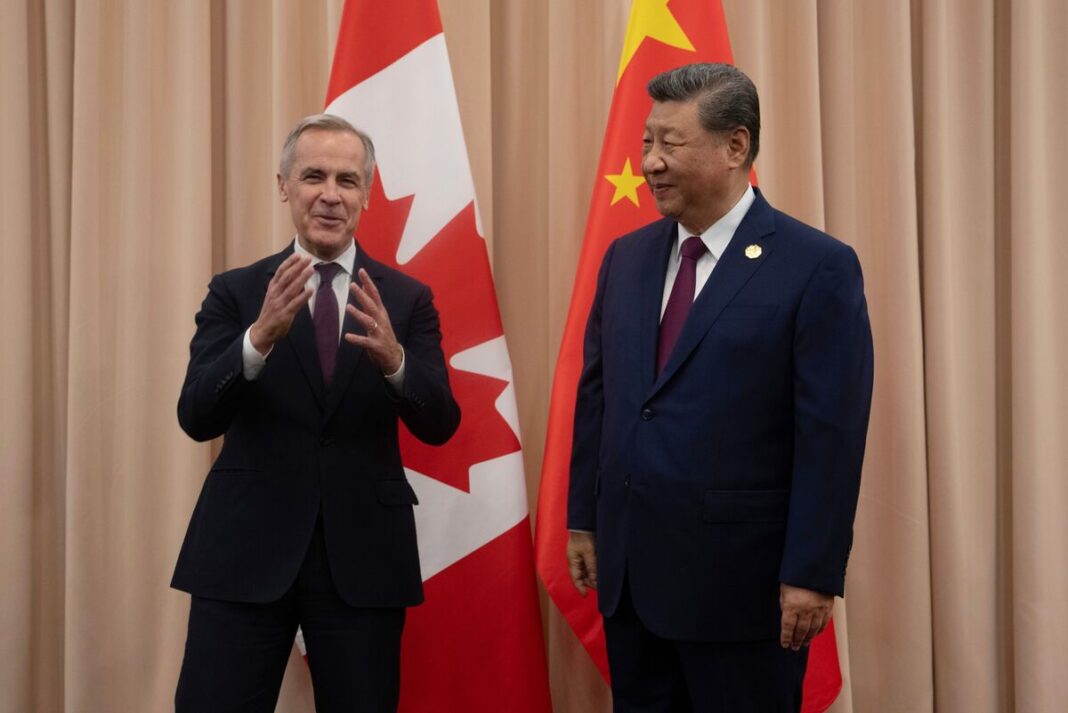Mark Carney’s Visit to China: Understanding the Dynamics of Tariff Negotiations
Setting the Scene: The High-Stakes Meeting
In a world where international trade disputes can reshape economies overnight, the meeting between Canadian Prime Minister Mark Carney and Chinese President Xi Jinping held significant importance. Scheduled amid an increasing tension surrounding tariffs and trade relations, expectations were high for immediate breakthroughs. However, Carney underscored that achieving drastic changes, particularly concerning Chinese tariffs on Canadian goods like canola, was never a realistic expectation for this encounter.
The Context of Tariff Issues
Tariffs have become a critical focal point in international relations, particularly between Canada and China. Tariffs are taxes imposed on imported goods, which can inflate prices and lead to reduced sales. For Canada, this is especially pertinent given its robust agricultural exports, including canola, which has been at the heart of recent trade tensions. Carney’s remarks highlight the ongoing complexity of these negotiations, emphasizing that they cannot be resolved in a single meeting, no matter how pivotal the players involved might be.
Understanding Canola’s Role in Trade Relations
Canola is one of Canada’s most significant agricultural exports, and its importance cannot be overstated. The crop is not only a source of revenue for farmers but also a key ingredient in many products globally. However, the imposition of tariffs by China has had a dampening effect on sales, leading to growing frustration among Canadian farmers and stakeholders. This dynamic illustrates how individual commodities can symbolize broader economic ties and tensions, making their resolution essential but challenging.
The Nuance of Diplomatic Expectations
Carney’s candid acknowledgment reflects a realistic approach to diplomacy. While leaders often meet with high hopes for quick resolutions, the intricacies of international trade relations mean that progress can be slow and fraught with obstacles. Complex negotiations typically require time, patience, and often multiple rounds of discussions. This reality speaks to the need for sustained dialogue rather than expecting immediate, sweeping reforms.
Broader Implications of the Meeting
The meeting between Carney and Xi is not just about tariffs on canola; it reflects a broader narrative of Canada-China relations. Both countries share interests in trade and investment, yet they also grapple with differing political ideologies and economic strategies. Carney’s engagement with Xi marks an attempt to navigate these diversities, underscoring the delicate balancing act of fostering collaboration while addressing contentious issues.
Future Outlook: Steps Toward Progress
While immediate changes to tariffs were deemed unrealistic, this does not signal a dead end in diplomatic efforts. Instead, it highlights the importance of building toward a more constructive dialogue. Such discussions can pave the way for gradual improvements in trade relations. Stakeholders in Canada are hopeful that future negotiations can focus on creating frameworks that both address tariff concerns and facilitate a more robust trade partnership.
The Importance of Domestic Support
As the government seeks to navigate its international engagements, the opinions and needs of Canadian farmers remain crucial. Domestic support for trade policies is essential for executing successful negotiations on the global stage. Continuous communication between the government and agricultural communities is vital to ensure that their interests are accounted for in negotiations, fostering a sense of collective purpose.
Navigating the Complex Terrain of Global Trade
In the grand tapestry of global trade, interactions like those between Carney and Xi highlight the interconnected nature of economies across the world. Each meeting leaves behind a mark, influencing public perceptions, domestic policies, and ultimately, the daily lives of individuals and communities reliant on trade. The urgency of the moment cannot overshadow the complexities involved, necessitating a thoughtful, strategic approach to how Canada engages with China and beyond.
As leaders like Carney grapple with the challenges of international diplomacy, they underscore a crucial lesson: meaningful change in global trade often requires more than just high-profile meetings. It demands a nuanced approach that builds trust, fosters collaboration, and ultimately, seeks common ground amid the intricacies of economic relationships.



